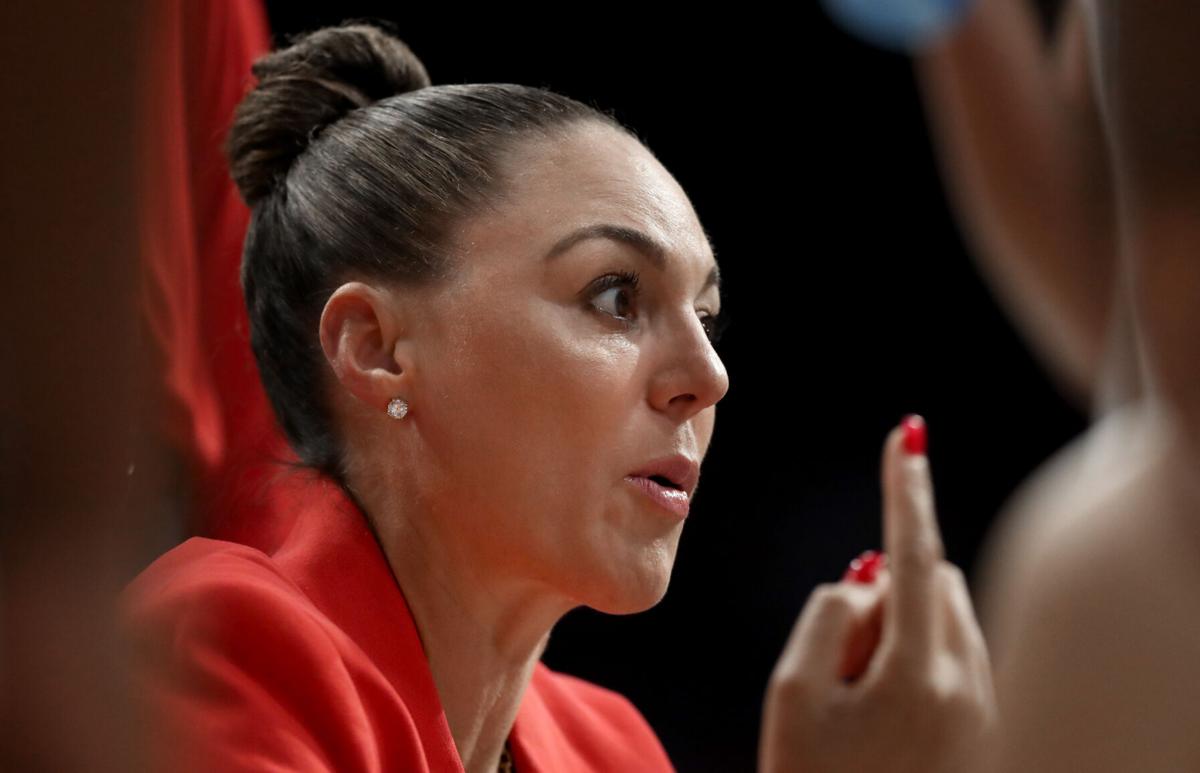Things are so much different now than a year ago.
Back then, the Arizona women’s basketball team was kicking off its season with a pair of nonconference games in a fan-less McKale Center. There were no COVID-19 vaccines yet, much less boosters.
Instead, the Wildcats practiced in masks and got tested every day.
Things may feel different in 2021, but the UA is still dealing with the pandemic. The seventh-ranked Wildcats were reminded of that last week, when UC Riverside canceled Friday’s scheduled matchup because of COVID-19 cases in its program. Iowa, Tulsa and Brown are among other programs who have had to shut down early this season because of positive tests.
Arizona coach Adia Barnes talked Wednesday about the virus’ impact so far this season. While things have changed, and vaccines and boosters are helping, case numbers are still high. It’s enough to worry Barnes, who watched last year as five of the Wildcats’ Pac-12 games were postponed due to COVID-19 protocols in her program and others’.
“It just feels different, but it’s really not different, numbers-wise,” Barnes said Wednesday. “You feel like it’s kind of gone, but then you know it’s not when you see teams shutting down. It’s just kind of an uncertain time. I don’t know how to explain it.”
The UC Riverside game is considered canceled, but not forfeited. Barnes thought about scheduling a game with one of the other teams that UCR was supposed to play — Santa Clara or Loyola Marymount — but couldn’t make the dates line up. She didn’t want to start changing dates and possibly end up playing back-to-back games. As a result, the fully vaccinated Wildcats will only play 11 nonconference games instead of 12.
UA’s protocols have drastically changed this year. No longer are athletes taking daily COVID-19 tests, wearing masks in practice or staying away from teammates. Even the terms have changed: “contact-traced” has become “high-risk exposure.”
Players who have a high-risk exposure and are vaccinated can still practice on a limited basis, albeit with a mask on. However, they still can’t be in the locker room until they’ve tested negative for the virus twice.
The relaxing of protocols — and advent of vaccines and boosters — appear to be helping the athletes’ mental health as well.
A recent issue of ASU’s Global Sports Matters focused on Stanford’s women’s team went through on their journey to the national championship last spring. The Cardinal — and Arizona, the team Stanford beat for the title — spent three taxing weeks on lockdown in San Antonio.
“Last year they couldn’t go to each other’s rooms, they couldn’t have roommates in their room. We couldn’t eat in common spaces,” Barnes said.
“It’s much easier (this year) … I think it’s much easier mentally because on the road, you have some kind of life. You can be next to your partners, you can room, go to dinners. We couldn’t do that stuff for a long time. I think that was the mental part — not being able to go to your friends’ houses and not being able to go hang out. Still, they can now, but it’s dangerous. We’re talking to our team about not going to parties and stuff, because the reality is you go to a party you have much more to lose as a student-athlete.”
Barnes called it “a really hard year” on her players — one that may be starting to ease up.
“They’re in a much better space mentally” this season, she said.
Barnes says she tells her players to stay diligent and focused. She has received a booster.
“Although we’re all vaccinated … you can’t let your guard down,” she said. “I feel like younger players — 18-, 20- to 23-year-olds — I think they feel a pretty secure with having the vaccine and not catching it. … (It’s) just educating them and enforcing all the time that you need to wear your mask in the grocery store because we have so much more to lose. As a team, to forfeit four games (would) … be devastating right now.”
Senior Cate Reese is among the Wildcats players sharing the message with their teammates.
“We have to be really aware of our surroundings and who we’re hanging out with and who we’re being with, especially now just because we’re going to lose a game if we have someone on the team gets COVID and knocks everyone out,” Reese said. “That’s really serious, and we don’t need a loss without even playing the game. We’re just being really careful. I think that’s the main thing right now. It’s just being safe.”
Rim shot
Before he died Nov. 22 of leukemia, UA superfan Lino Cordova made a difference. Cordova, along with Barnes, asked UA fans to donate tissue boxes before their Dec. 19 game against Marist. Fans brought 2,700 of them — a figure that was matched by Costco for a total of 5,400. The tissues were donated to Banner-University Medical Center’s Pediatric Unit on Wednesday.





